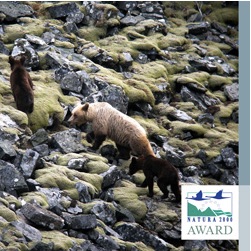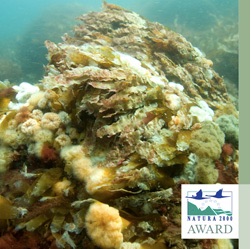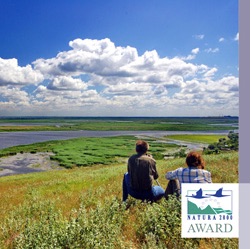Species and habitat degradation are huge problems in Europe yet the EU is not on track to meet its target of halting biodiversity by 2020. What is the problem and where is the solution – legislation, communication, valuation? irishenvironment.com explores the issue.
The communication conundrum
While almost nine out of ten Europeans believe that biodiversity loss – the decline and possible extinction of animal species, flora and fauna, natural habitats and ecosystems in Europe – is a problem, the campaign to prevent habitat and species loss and degradation has never quite captured the public imagination. Certainly not in the same way that the ongoing offensive against climate change has. It’s quite a demand to ‘sell’ the loss of certain species of bat or the degradation of grasslands, for example, in the epic terms of contemporary climate change discourse. Biodiversity loss – a silent and creeping but detrimental threat – simply has not fit so smoothly into a campaign narrative.
The Natura 2000 network, an EU-wide network of nature protection areas established under the 1992 Habitats Directive, was set up to protect habitats and species and, by involving citizens in the process, perhaps also redress public apathy. Indeed the network prides itself on public involvement, insisting that it is not a ‘system of strict nature reserves where all human activities are excluded’ but a mixture of reserves and privately owned land with an emphasis on sustainable management, both ecologically and economically. Natura 2000 now covers 18% of EU land and 4% per cent of EU marine waters. However many would argue that with 60% of the EU’s protected species assessments and 77% of habitat assessments recording an unfavourable conservation status, it is nowhere near expansive enough. Note 1.
More support is needed, and the Natura 2000 Awards, which took place on 21 May recognising six top conservation efforts is one way to engage the public in the debate.
Spain’s Fundación Oso Pardo (FOP) was honoured at the awards in the category of reconciling interests/perceptions for its work on reconciling the practice of hunting with the conservation of bears in the north of the country. FOP has worked to develop agreement around the conservation of bears with the Spanish and Cantabrian hunting federations, involving more than 4,500 hunters and affecting more than 280,000 hectares of bear territory. Fernando Ballesteros from FOP views Natura 2000 as a powerful tool for nature and biodiversity conservation, however he notes that improved communication to the population is needed because “Natura 2000 is not known at local level”.
Indeed seven out of ten Europeans surveyed by Eurostat totally agree that the EU should better inform citizens about the importance of biodiversity. Ulrik Christian Berggreen from the Danish Ministry of the Environment, which picked up the Conservation Award for its work on the restoration of stone reefs in Denmark, notes that biodiversity in general does not receive adequate attention in Europe as it “is hiding behind the climate debate”. Berggreen was among the team on the Blue Reef project – one of the first large-scale restoration projects of its kind in a marine area – that succeeded in restoring around 5 hectares of cavernous boulder reefs, a particularly rich type of marine habitat.
Legislation and implementation of Natura 2000
Georg Frank, Secretary General of award-winning project DANUBEPARKS, concurs that a Natura 2000 approach is the way forward: “Nature 2000 is a great idea: for the first time, on a European-wide scale nature conservation has defined its priority areas (and species). Nature conservation needs such a pro-active approach on a transnational scale.” DANUBEPARKS, which took the top prize in the category networking and cross-border cooperation, is a network of 17 protected areas in nine countries along the Danube River working together since 2009. Within five years, over 150 actions focused on habitat management, conservation of flagship species, river restoration, nature tourism and public awareness have been implemented along the river corridor. However Frank also points to the gaps at operational level in the form of a lack of site managers: “What is missing for an efficient implementation of Natura 2000 is the establishment of site managers on the spot: most important is to have people who work on the spot, including the ‘local’ know-how and experiences, and who feel responsible for the area – and from my perspective, this is sometimes missing for Natura 2000. So for me, the key is the establishment of site managers and protected areas´ administration.”
Ballesteros from FOP sounds a note of concern around potential changes in the legislation that anchors Natura 2000 – the Habitats and Birds Directives. These Directives are currently undergoing a critical analysis – or ‘fitness check’ – by the European Commission: “We are quite worried about the ‘fitness check’ for EU nature legislation … and we hope that this process will conclude with findings that underline the importance and necessity of [the Habitats and Birds Directives] as legal tools.” Following an “evidence-gathering exercise” earlier this year, the fitness check process has now moved onto a 12-week public Internet consultation, which is open to all.
Ecosystem services valuation
The valuation of ecosystem services is becoming an increasingly popular approach, and may be one way to truly engage the public in biodiversity protection. Advocates say that by placing a tangible value on ecosystems, they will be better protected. Ballesteros supports the idea but insists that ecosystems must not be valued exclusively for their financial benefits: “It must be seen in a wide way, because not only monetary value is important, also ecological services and even feeling and emotional services must be keep in mind. But in practical ways, the possibility of taking advantage of bear presence, for instance, as a way to improve rural development is a nice opportunity for better conservation and reconciling of interests.”
Frank, from the DANUBEPARKS, agrees that there is a place for economic valuation but we must not be limited to this way of viewing biodiversity: “In a (economic) system where all is calculated based on economic values, the valuation of ecosystem services can help us to understand the important role of natural areas and protected areas. However, long-term ecosystem services will hardly be an efficient argument against short-term economic benefits.” He adds, “Not all natural values can be clearly valued. So from my perspective, ecosystem services are important additional arguments, hopefully this is besides a commitment from the society to take care also for species, habitats etc. which do not deliver the great economic added values.”
Note 1. SOER 2015 — The European environment — state and outlook 2015 www.eea.europa.eu/soer
Aoife O’Grady is an Irish, Brussels-based journalist who is the Brussels Correspondent for irish enviornment





No comments yet, add your own below